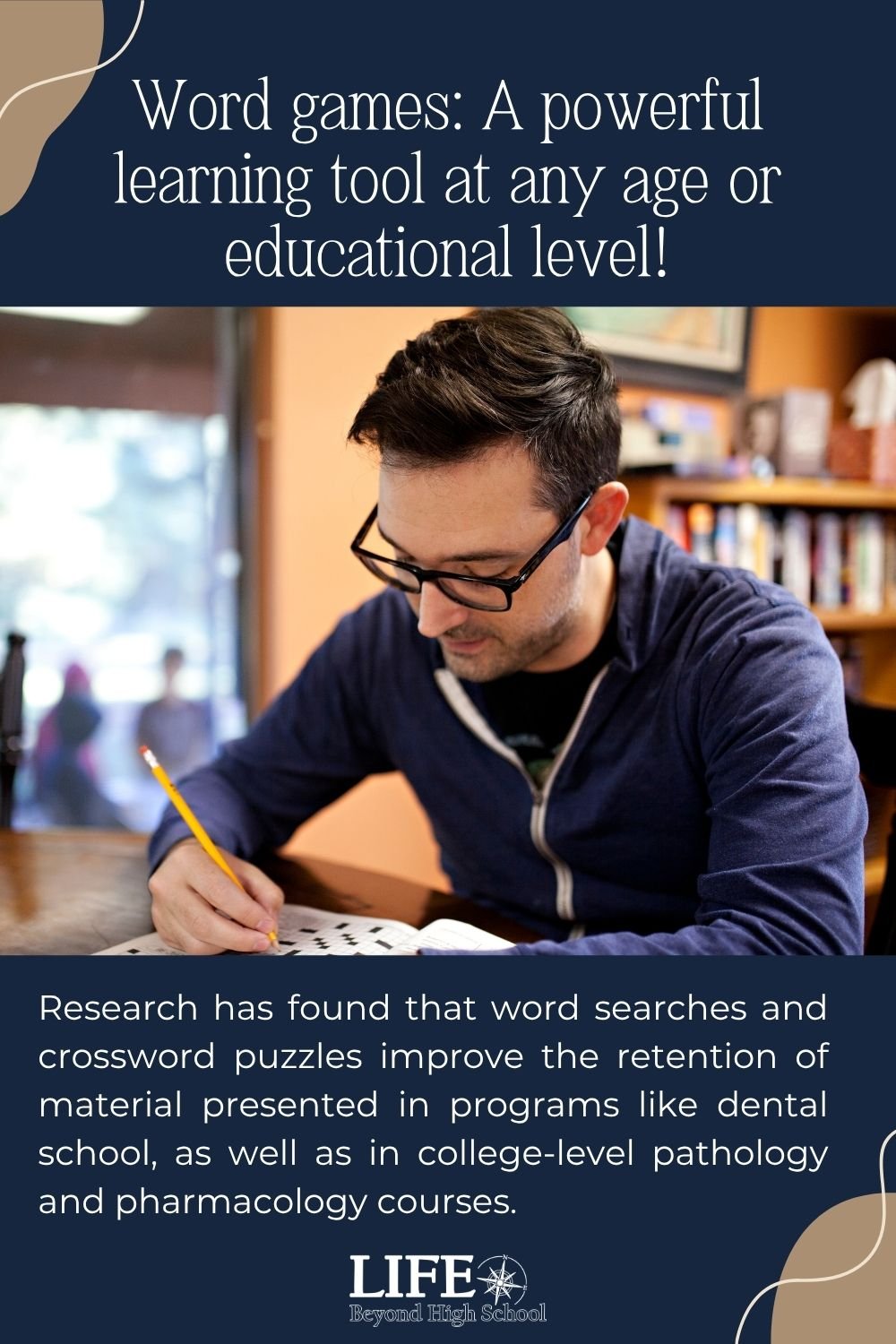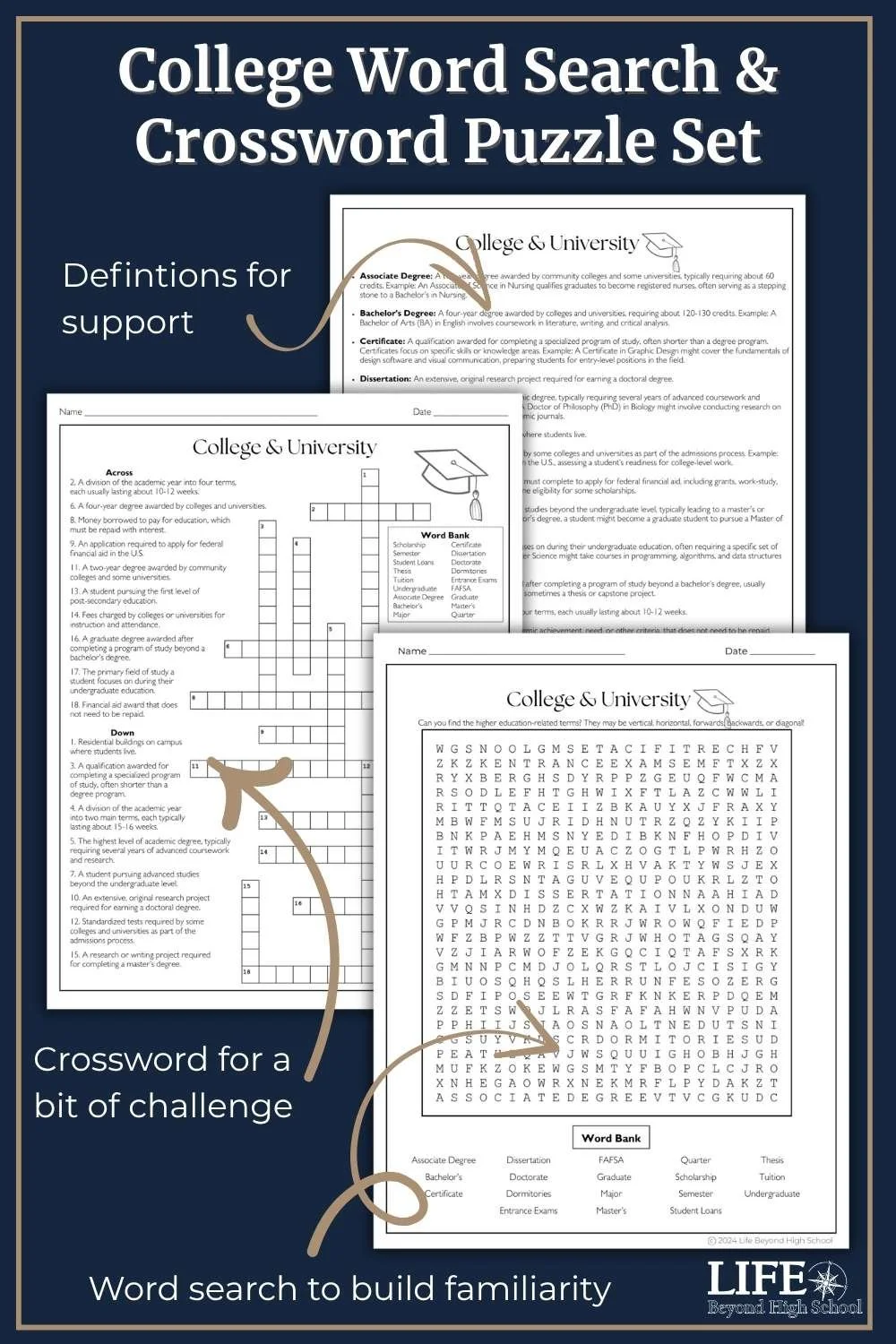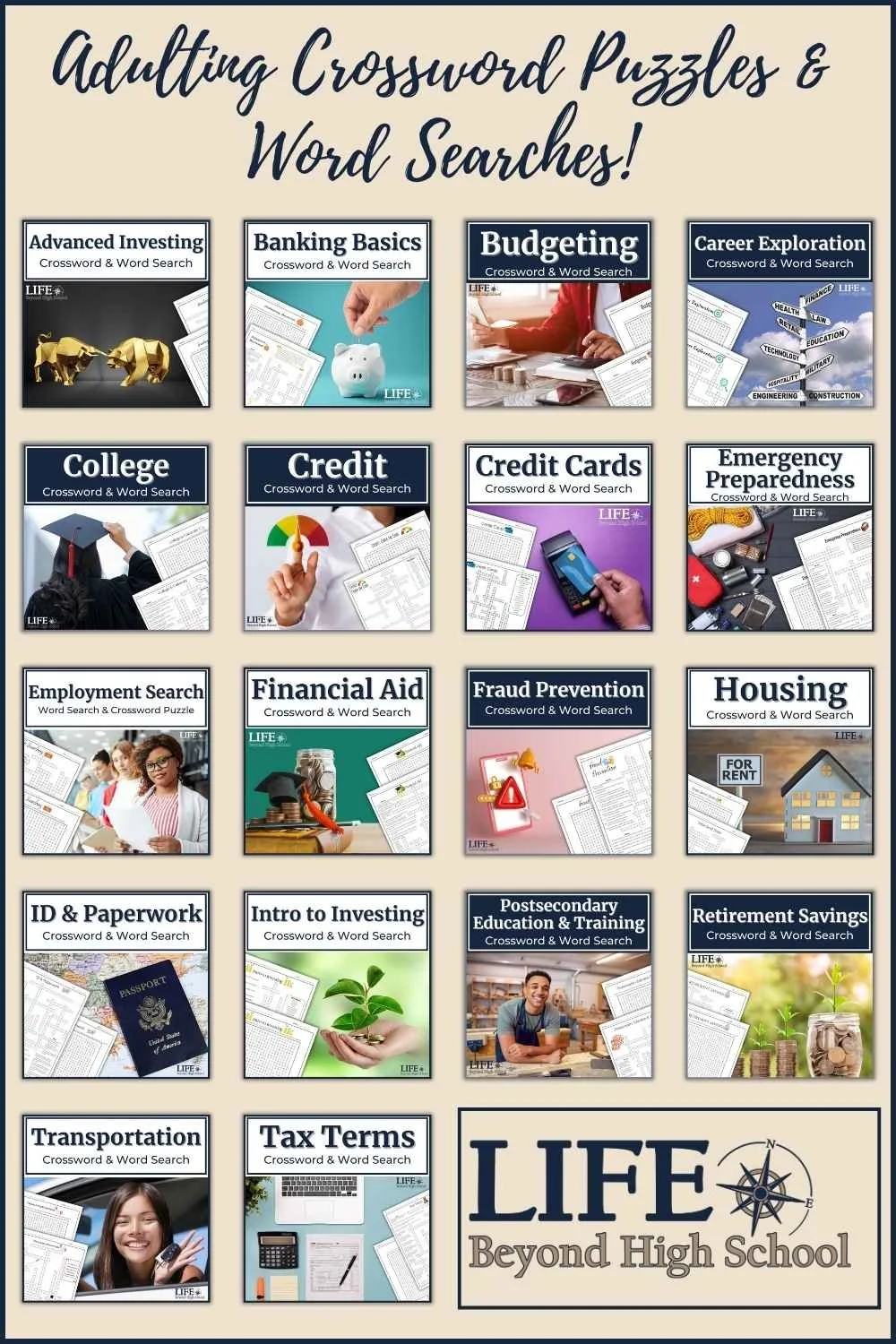The Benefits of Word Puzzles for High School & Adult Learners
Originally published August 2024. Updated October 2025 to include new examples, FAQs, and classroom insights.
I am a confessed logophile or lover of words. Puns, riddles, Wordle, Scrabble, Wheel of Fortune… if it involves letters, I’m in. So, bringing word searches and crosswords into my classroom felt like a natural choice.
But it turns out these old-school favorites aren’t just fun; they’re also powerful learning tools. Research from Harvard University and Scientific American shows measurable cognitive gains from puzzles: better vocabulary, stronger memory, improved focus, and higher retention. While they’ve long been staples of elementary classrooms, they’re equally valuable for older students, high schoolers, and adult learners.
Between grading, IEP meetings, and fire drills, we all need activities that reinforce learning and restore calm. Let’s look at why these classic word games still deserve a place in the high school or adult-ed classroom.
Why Word Puzzles Still Belong in Secondary Education
Word puzzles do something few other activities can: they teach and entertain at the same time. They reinforce subject-specific vocabulary, strengthen recall, and promote persistence - all without intimidating students who may feel anxious about academics.
Crosswords and word searches activate multiple regions of the brain, combining pattern recognition with language processing. The result is improved memory, higher engagement, and stronger language connections. In short, puzzles give learners repeated, low-stress practice with essential vocabulary–exactly what we want in life skills and transition classrooms.
(If you’d like ready-to-use examples, check out my Adulting Word Puzzles collection for classroom-tested sets.)
Crossword Puzzles: Building Vocabulary and Memory
Crossword puzzles are a natural fit for reviewing complex or technical terms. Students must connect each clue to its meaning, which encourages deeper processing and context recall. Studies show that this visual-verbal pairing helps transfer information from short-term to long-term memory.
I use crosswords to review key terms in lessons like Credit Cards, College & University, and Soft Skills for Employment. They work beautifully after discussions or PowerPoint lessons as students apply what they’ve learned, recognize where they’re unsure, and get instant feedback without the pressure of a test.
Word Searches: Low-Pressure Practice That Builds Confidence
Word searches sometimes get dismissed as “busy work,” but research disagrees. A 2023 study found that word searches support spelling, word recognition, and even reading comprehension. For older students and adult learners, that’s a triple win.
These puzzles help students:
Strengthen short-term memory and visual tracking
Expand sight-word vocabulary
Develop sustained attention and focus
When students successfully find and highlight challenging words, they also experience immediate success and a small confidence boost that leads to bigger ones later.
Collaborative or Independent: How Word Puzzles Work for Every Classroom
Word puzzles are wonderfully flexible. They can fill ten minutes at the end of class or anchor a full-period review.
Try them in pairs or small groups to spark discussion and cooperative problem-solving. Students debate definitions, share knowledge, and model peer teaching (sometimes with a little friendly competition). Or, assign them independently as a calm, structured activity for sub days, testing weeks, or transition periods.
Differentiation Made Easy
Crosswords and word searches naturally support a range of learning styles.
Visual learners track letters, highlight patterns, and organize information spatially.
Verbal learners focus on meaning, definitions, and context clues.
Students with disabilities or English learners get repeated exposure to important terms in a low-pressure format.
I like to ramp up the level of difficulty with these puzzles as the year progresses:
Start with a word search.
Move to a crossword with a word bank.
End with a more challenging version of the crossword without support.
That gradual shift reinforces vocabulary and builds confidence every step of the way.
Other times, I like to let students exercise choice and pick the type of puzzle or level of difficulty they are ready for that day. All of the students are reviewing the same vocabulary terms, but in a format that meets their readiness level.
Are Puzzles Just Fluff?
Without thoughtful intention or appropriate context, puzzles can be mistaken for filler activities. But when they align with your curriculum, they become powerful reinforcement tools. On-topic puzzles review vocabulary and concepts already taught, helping students solidify understanding while giving them a mental break that still feels purposeful.
Brain Breaks That Still Teach
After a lecture or writing activity, puzzles engage different cognitive processes and literally provide a “brain break.” Solving crosswords and word searches also lowers cortisol levels and boosts mood. Lower stress means lower “affective filters,” making students more open to learning.
I use word searches and crossword puzzles with my high school students throughout the year. Every once in a while—usually near a holiday break, finals, or a big sports event—you can feel the energy in the room getting too high. Whether it’s nerves, excitement, or stress, there’s a tangible buzz in the air. I’ll put on a little instrumental music (my go-to is the Bridgerton soundtrack) and let students work on puzzles for 15–20 minutes. You can feel the room calm down. Academically, it reinforces material we’ve covered earlier in the year. Socially, emotionally, and behaviorally, it provides a much-needed reset.
That blend of content review and classroom management support is what makes puzzles such a reliable tool in any teacher’s toolkit.
Get the Benefits Without the Prep
Every puzzle I design blends these cognitive and classroom benefits into ready-to-use activities for teachers. If you want to try them in your own classroom, start here:
Explore more puzzles:
🧩 Explore Puzzle Bundles → Life Skills or Financial Literacy
🧩 Shop Best Sellers → Credit Cards or College Puzzle Sets
🧩 Browse All Adulting Games & Puzzles → TPT Store
Real-World Vocabulary for Life After High School
Puzzles are also ideal for teaching practical, real-world vocabulary.
Words like deductible, net pay, lease agreement, and interest are part of everyday life, yet they rarely appear in traditional curricula.
That’s why many of my lessons include built-in puzzle sets where students first learn key vocabulary, then reinforce it through play. For example, my How to Rent an Apartment lesson guides students through reading a lease, completing a rental application, identifying scams, planning their move, and taking a short home-safety quiz. Later in the year, I pull out the related word search and crossword puzzle to help students revisit and retain the housing vocabulary and concepts they learned earlier.
For a seasonal twist, I use Adulting in Autumn: Finding Your Fall Traditions. It helps students explore new hobbies and traditions they can embrace as they move into adulthood. It’s a fun transition-focused twist on the usual Halloween activities and makes a great addition to the October lineup.
If you’d like more seasonal options, I release new holiday and real-world adulting puzzles throughout the year. They’re perfect for those high-energy days before breaks.
Teacher FAQ: Making Puzzles Work in Your Classroom
How do I explain this to my administrator—or what if I get an informal observation while students are working on puzzles?
That’s a big part of why I wrote this post! Puzzles sometimes get a bad rap, but research consistently shows their academic and cognitive benefits. When they’re aligned with your lessons, they’re not “fluff” — they’re evidence-based review tools that reinforce vocabulary, strengthen memory, and support critical thinking. If an observer walks in, you can confidently explain that students are practicing retrieval, building focus, and transferring information from short-term to long-term memory — all while lowering stress levels. Having that research-based rationale ready goes a long way during any observation.
Do students really enjoy puzzles?
Absolutely. My students look forward to “puzzle days.” Sometimes everyone works on the same one; other times I let them choose between a word search or a crossword, with or without a word bank, depending on how much challenge they want. They know the routine: music playing softly in the background, quiet conversation, and focused puzzle time. It’s calm, structured, and genuinely productive.
How much prep time do they take?
Almost none. Most are print-and-go and can be used independently, in pairs, or as quick bell-ringer or sub-day activities. Once students know the format, puzzles become an easy, consistent routine that you can use anytime the energy in the room needs a reset.
Final Thoughts
Incorporating puzzles into your classroom isn’t filler. It’s smart, evidence-based instruction. Word searches and crosswords blend cognitive benefits with hands-on engagement, helping students strengthen vocabulary, build confidence, and connect learning to real life.
Whether you’re prepping for a sub day, wrapping up a unit, or just need a ready-to-go activity that keeps everyone on task, puzzles deliver. When you’re ready to add more variety, explore my growing collection of real-world puzzle sets and bundles to make life-skills learning engaging and effortless. And you might even convert a few of your students into fellow logophiles along the way.





